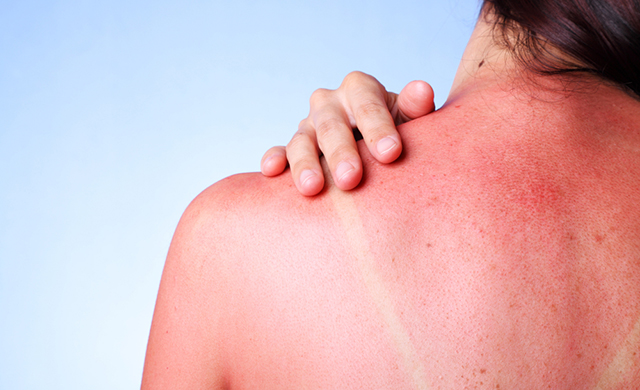
How to Relieve an Itchy Sunburn Fast, According to Dermatologists
09/06/2019 06:00AM | 5242 viewsBY Darcy Jacobs
The only thing worse than an incredibly painful sunburn? An incredibly painful, itchy sunburn.
You can get itchy for all sorts of reasons, but it’s often just your body’s way of telling you that your skin or nerve cells are dealing with some sort of issue.
“Itching is a sign of inflammation, which is your body’s response to an injury, like a sunburn,” explains Lisa Chipps, MD, a board-certified dermatologist in Beverly Hills, California, and a spokesperson for The Skin Cancer Foundation. After a nasty sunburn, the outermost layer of your skin gets dry (and may even peel) to help promote new, healthy skin cells to the surface.
The problem? Scratching at a sunburn is not only painful, but can also increase your risk of infection and scarring, says Dr. Chipps. Mild sunburns often fade within a few days, but more serious cases can last up to two weeks—which can feel like an eternity when you’re dealing with an itch you can’t scratch.
While the degree of itching varies from person to person, says Dr. Chipps, some people are more susceptible to a particularly intense post-sunburn itch dubbed as ‘Hell’s itch.’ While it only affects a small percentage of people, the symptoms are described as an uncontrollable, relentless itch that comes in waves within 48 hours after a sunburn, per the Cleveland Clinic.
But the worst thing you can do is give into temptation. While scratching an itchy sunburn feels good in the moment, it only increases inflammation and damages the skin even further, which worsens the itch, says Dr. Chipps.
How to stop sunburn itch fast
Your itchy sunburn should subside as soon as the skin heals, and there are a few things you can do to speed up the process.
Use gentle moisturizers
Dr Chipps recommends slathering your skin in bland, fragrance-free moisturizers that contain hydrating and calming ingredients, like ceramides, oat extract, aloe vera, and vitamin E (as long as you have no known allergies or sensitivities to them.) Avoid pretoleum- or oil-based products, as they can trap heat into the skin.
Advertisement - Continue Reading Below
Then, try the “soak and smear” technique, says Jules Lipoff, MD, a board-certified dermatologist and assistant professor of clinical dermatology at University of Pennsylvania’s Perelman School of Medicine. Simply apply your body lotion, like CeraVe Moisturizing Lotion, to damp skin after soaking in a cool bath for 10 to 20 minutes to lock moisture into the skin.
Apply hydrocortisone cream
Applying an over-the-counter topical steroid, like 1 percent hydrocortisone cream, can help reduce inflammation, soothing an itchy sunburn in the process, says Dr. Lipoff. Avoid products that contain benzocaine or other ingredients ending in ‘-caine,’ as they can be irritating, according to the American Academy of Dermatology.
Reach for OTC medications
Because itchiness can increase as your skin heals, topical treatments may not always be enough to find relief. In this case, taking an OTC medication like ibuprofen or acetaminophen can help quell itchiness, as well as pain. Antihistamines, like Benadryl or Zyrtec, can also help relieve an itchy sunburn. Just make sure you opt for non-drowsy options during the day.
Try a cool compress
Cool compresses, baths, and showers feel incredibly good on hot, itchy skin. Dr. Lipoff also recommends storing your favorite moisturizers in the fridge, so they’re cool when you apply them to your body.
Stay hydrated
You’re more likely to become dehydrated when you have a sunburn, since you’re body is trying to compensate for the skin’s loss of fluid. As soon as you notice you’re burned, drink water and even sports drinks to replenish electrolytes, says Dr. Chipps. Continue drinking extra liquids until you’re no longer sunburned.
How to prevent an itchy sunburn
The best way to prevent an itchy sunburn is to protect your skin from the sun’s harmful UV rays in the first place. “A sunburn may seem like a temporary irritation, but it can cause long-lasting damage to the skin,” says Dr. Chipps, such as premature aging and skin cancer, including melanoma.
So while you’re out enjoying the weather, stay in the shade when possible, wear protective clothing when possible (such as a cover-up, hat, and sunglasses), and always use a broad-spectrum sunscreen with an SPF 30 or higher. Always reapply every two hours and after swimming or sweating.











Post your Comment
Please login or sign up to comment
Comments